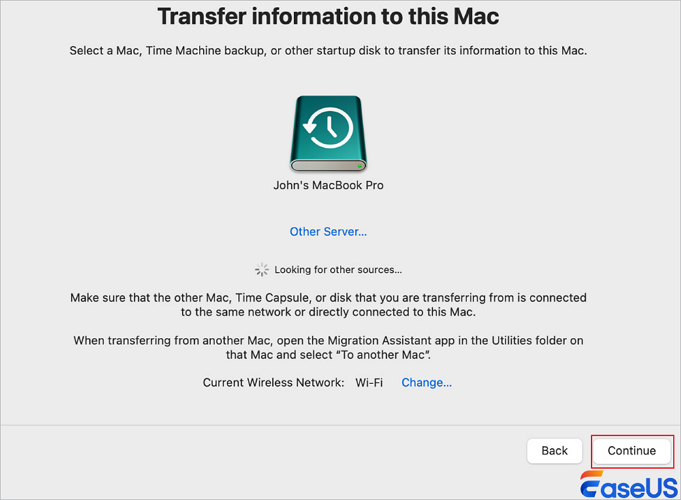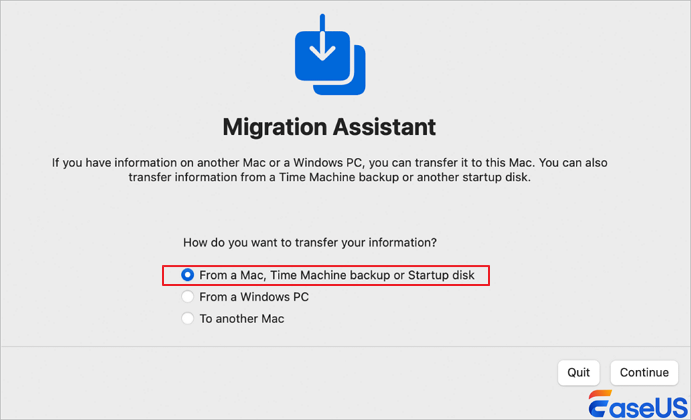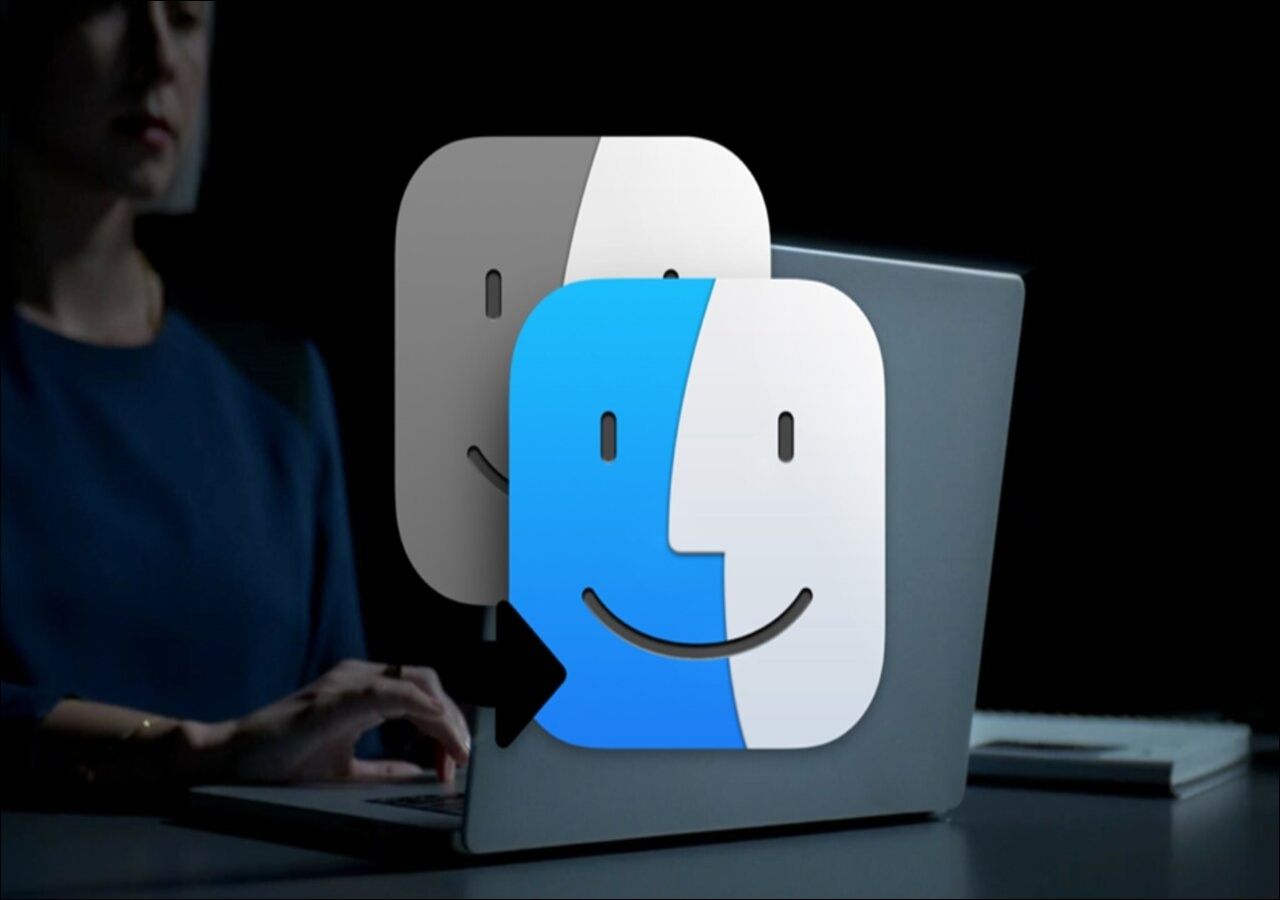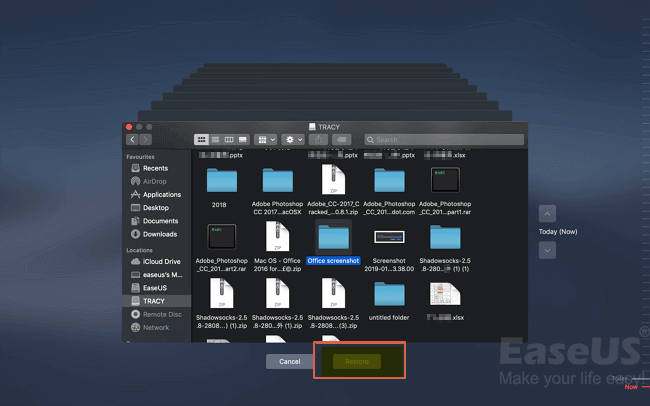Start Your Free Trial!
Sign up to our newsletter, stay updated on news and exclusive offers from EaseUS. Don't worry, if you change your mind, you can unsubscribe at any time, free of charge. We value your privacy (Privacy Policy).
Table of Contents
![]() About the Author
About the Author
![]() Reviews and Awards
Reviews and Awards
I've been forced to clean and reinstall Sonoma because the update destroyed my MacBook. After hours of going through a combination of all the different processes Apple says to do, I finally installed it. Now, how do I restore a Time Machine backup? I'm getting the "you haven't selected a location for Time Machine backups" message. If it wipes what's already on there, I'm scared to set up my drive in Time Machine in settings. from Reddit
To solve this problem and restore the Mac from a Time Machine backup after a clean install, follow these step-by-step instructions:
| Workable Solutions | Step-by-step Troubleshooting |
|---|---|
| Fix 1. Restore During macOS Setup | Immediately after a clean macOS installation, you can restore files as part of the setup...Full steps |
| Fix 2. Use Migration Assistant | you can use the Migration Assistant to restore your files after the clean install...Full steps |
| Fix 3. Recover with Data Recovery Software | If you cannot restore the files you want from Time Machine or have never made a backup...Full steps |
| Fix 4. Manually Restore Specific Files | You can manually recover from the Time Machine if you only need to restore specific files...Full steps |
Remember that data security always comes first, and the restoration process can take some time, depending on the size of your backup and the speed of your drive. It's important not to interrupt this process.
Immediately after a clean macOS installation, you can restore files as part of the setup process. Your Mac will restart and launch the setup assistant. Follow the setup instructions.
Step 1. Click "Continue" when you reach the "Transfer Information to This Mac" screen.
Step 2. Connect the external drive that contains your Time Machine backup.
Step 3. Choose the Time Machine backup you want to restore. If your backup is encrypted, you may need to enter a password.
Step 4. You can transfer Applications, User Accounts, Settings, and Files. Depending on your choice, the data might take a while to transfer.

Your Mac will finish restoring the data and then boot into the desktop.
If you've already set up your new macOS without restoring files, you can use the Migration Assistant to restore your files after the fact.
Step 1. Open the Migration Assistant by going to "Applications" > "Utilities" > "Migration Assistant."
Step 2. Click "Continue." You might be prompted to close other applications.
Step 3. Choose the option to transfer from a Time Machine backup or startup disk.

Step 4. Attach the drive containing your Time Machine backup.
Step 5. Choose the appropriate Time Machine backup. Enter the password if required.
Step 6. You can select specific applications, user accounts, settings, and files. Click "Continue" to start the transfer.
After the transfer is complete, your Mac will restart if necessary, and you should see your files and settings restored.
8 Ways to Fix Migration Assistant Not Working on Mac
Is migration assistant not working on your mac? Worry no more; this article will help fix the issue with multiple methods!

If you cannot restore the files you want from Time Machine or have never made a backup, your better choice is to get a capable Mac data recovery application and restore lost data after clean installing Mac as soon as possible.
EaseUS Data Recovery Wizard for Mac is well-known for its data recovery capabilities. It is compatible with all MacOS and Mac OS X versions, including the most recent macOS Sequoia, has deep scan capabilities, and has over a decade of experience. It's the best choice if you're experiencing trouble recovering lost Mac data and want a simple yet effective solution.
Step 1. Select the location
Select the disk where you lost data after updating to macOS Sonoma/Ventura/Monterey/Big Sur. Then, click "Search for lost files".

Step 2. Find lost data after the scan
EaseUS Data Recovery Wizard for Mac will immediately scan your selected disk volume and display the scanning results on the left pane. Use the file type and file path to find wanted data on Mac.

Step 3. Recover data after macOS update
Select the target files that were unknowingly lost during or after the update and click the "Recover" button to get them all back.

Many Mac users have proved the tool's efficacy. If you are interested in resolving the Mac file recovery issue, share it on Facebook, Twitter, Instagram, and other social media platforms!
You can manually recover from the Time Machine backup if you only need to restore specific files or folders and not perform a complete system restore.
Step 1. Attach the external drive containing your Time Machine backup.
Step 2. Click on the Time Machine icon in the Menu Bar and choose "Enter Time Machine." If you don't see the icon, you can access Time Machine through System Preferences> "Time Machine."
Step 3. Use the timeline on the edge of the screen or the up/down arrows to navigate to the date of the backup from which you want to restore files.

Step 4. Browse the backups and select the files or folders you wish to restore. Click "Restore" to restore the selected files to their original location. You can also drag the files to the desktop or another folder.
Step 5. Once you have restored the necessary files, exit Time Machine.
Each method offers a different approach depending on whether you want a complete restoration or just specific files, providing flexibility based on your needs after a clean macOS installation.
You can access your data using the Time Machine application or your storage medium device if you backed it up before the reinstallation process. EaseUS Data Recovery Wizard for Mac can help; however, if you didn't backup your data before reinstalling, it will be lost.
If you still have some questions about MacBook data recovery, check the quick answers below to help yourself out:
1. Can you restore from Time Machine after setup?
You can. If your system or startup disk is damaged, you can restore your files using Time Machine to back up your Mac. Important: Erase and reinstall macOS before using your Time Machine backup to recover your files.
2. How do you back up a Mac for a clean install?
3. Can I reinstall macOS from Time Machine?
Find out how to install macOS again. Verify that your Time Machine backup disk is turned on and attached to your Mac. On your Mac, launch Migration Assistant. Your Applications folder's Utilities section contains Migration Assistant.
Was This Page Helpful?
Jaden is one of the editors of EaseUS, who focuses on topics concerning PCs and Mac data recovery. Jaden is committed to enhancing professional IT knowledge and writing abilities. She is always keen on new and intelligent products.
EaseUS Data Recovery Wizard Pro has a reputation as one of the best data recovery software programs on the market. It comes with a selection of advanced features, including partition recovery, formatted drive restoration, and corrupted file repair.
Read MoreEaseUS Data Recovery Wizard is a powerful system recovery software, designed to enable you to recover files you’ve deleted accidentally, potentially lost to malware or an entire hard drive partition.
Read MoreEaseUS Data Recovery Wizard is the best we have seen. It's far from perfect, partly because today's advanced disk technology makes data-recovery more difficult than it was with the simpler technology of the past.
Read MoreEaseUS Data Recovery Wizard Pro has a reputation as one of the best data recovery software programs on the market. It comes with a selection of advanced features, including partition recovery, formatted drive restoration, and corrupted file repair.
Read MoreEaseUS Data Recovery Wizard is a powerful system recovery software, designed to enable you to recover files you’ve deleted accidentally, potentially lost to malware or an entire hard drive partition.
Read MoreRelated Articles
How to Delete a User on Mac [2025 Update]
![]() Finley/Jan 09, 2025
Finley/Jan 09, 2025
Put Back Option Missing on Mac: Why and How to Recover Deleted Files
![]() Brithny/Nov 27, 2024
Brithny/Nov 27, 2024
Seagate Hard Drive Not Showing Up on Mac? Fix It!
![]() Jean/Feb 14, 2025
Jean/Feb 14, 2025
How to Fix Mac Video Not Working [5 Tried Solutions]
![]() Dany/Nov 27, 2024
Dany/Nov 27, 2024
CHOOSE YOUR REGION
Start Your Free Trial!
Sign up to our newsletter, stay updated on news and exclusive offers from EaseUS. Don't worry, if you change your mind, you can unsubscribe at any time, free of charge. We value your privacy (Privacy Policy).
Start Your Free Trial!
Sign up to our newsletter, stay updated on news and exclusive offers from EaseUS. Don't worry, if you change your mind, you can unsubscribe at any time, free of charge. We value your privacy (Privacy Policy).